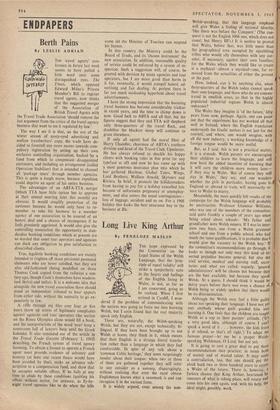Long Live King. Arthur
By PENELOP,E MASLIN There are, naturally, the Welsh-speaking Welsh, but they are not, except technically, bi- lingual. If they have been brought up to use Welsh at home, they think in it, which means that their English is a strange literal transla- tion rather than a language in which they feel comfortable. In spite of any talk about a `common Celtic heritage,' they seem surprisingly insular about their tongue; when two or three of them are gathered together they will refer to any outsider as a saesneg, disparagingly, without realising that even the most obtuse Englishman knows what a sassenach is and can recognise it in the variant form.
It is widely argued, even among the non- Welsh-speaking, that, this language emphasis will give Wales a feeling of national identity,
'like. there was before the Conquest.' (The con- quest is not the English 1066 one, which does not count, but Henry III's.) It is useless to protest that Wales, before that, was little more than the geographical area occupied by squabbling tribes who would ally themselves with any out- sider, if necessary, against their own families; for the Wales which they would like to create is a mythical—almost a mystical—one, far re- moved from the actualities of either the present or the past.
How, indeed, can it be anything else, when three-quarters of the Welsh today cannot speak
their own language, and those who do are concen- trated in smallish areas, so that in the highly populated industrial regions Welsh is almost unknown?
The Wales they ,imagine is 'of the future,' fifty years fiom now, perhaps. Again, one can point out that the experiment has not worked all that well in Ireland, where the English translation underneath the Gaelic notices is not just for the tourists, and where, one would imagine, with all the new industry, a working knowledge of a foreign' tongue would be more useful.
But, as I said, this is not 'a practical matter, it is a crusade. Welsh parents are encouraging their children to learn the language, and will
now have the added incentive of knowing that it will earn the children more money later—
if they stay in Wales. 'But of course they will stay in Wales,' they say, and one wonders whether the girls in particular, having gone to d England or abroad to train, will necessarily re- turn to Wales to marry.
Meanwhile, the most quickly felt results of the campaign for the Welsh language will probably be unattractive. Professor Glanmor Williams, who was one of the members of the committee, said quite frankly a couple of years ago when
being asked about schools: 'My father and grandfather were Welsh miners. If I was to inter- view two boys, one from a Welsh grammar school and one from a public school, who had much the same qualifications, it is probable that
would give the vacancy to the Welsh boy.' If the committee's recommendations go through, it looks as though not only may this kind of in- verted prejudice become general, but also the civil service, medical and nursing staff, secre- taries and what are called, vaguely, 'general administrators' will be chosen not because they are the best available, but because they speak Welsh. At a guess, I should think it would be thirty years before there was even a chance of v Welsh being so widely spoken that there would be no discrimination.
Although the Welsh may feel a little guilty about not speaking their language, I have not yet met anybody whose guilt goaded him into learning, it. One feels that the children are taught Welsh as a sop to their parents' attitude. (`It's a very good idea, although of course I can speak a word of it . . . however, the kids learn it at school, so that's all right.') To adapt the famous prayer—let me be a proper Welsh- speaking Welshman, 0 Lord, but not yet. It is going to' cost a great deal to put these recommendations into practice; in terms both of money and of wasted talent. It may sea a contradiction, too, that one should put the clock back two or three hundred years to create a Wales of the future. There is, however, a forlorn chance that King Arthur, heartened by rumours of what is taking place, will return and come into his own again, and, with his help, the ideal might, possibly, work.






































 Previous page
Previous page